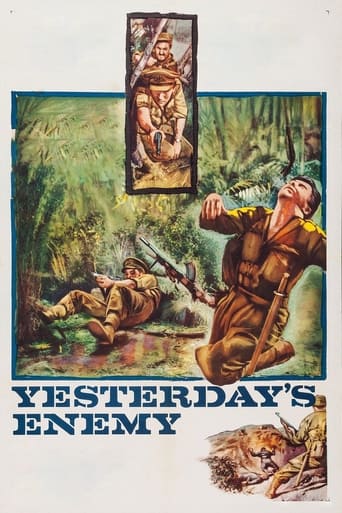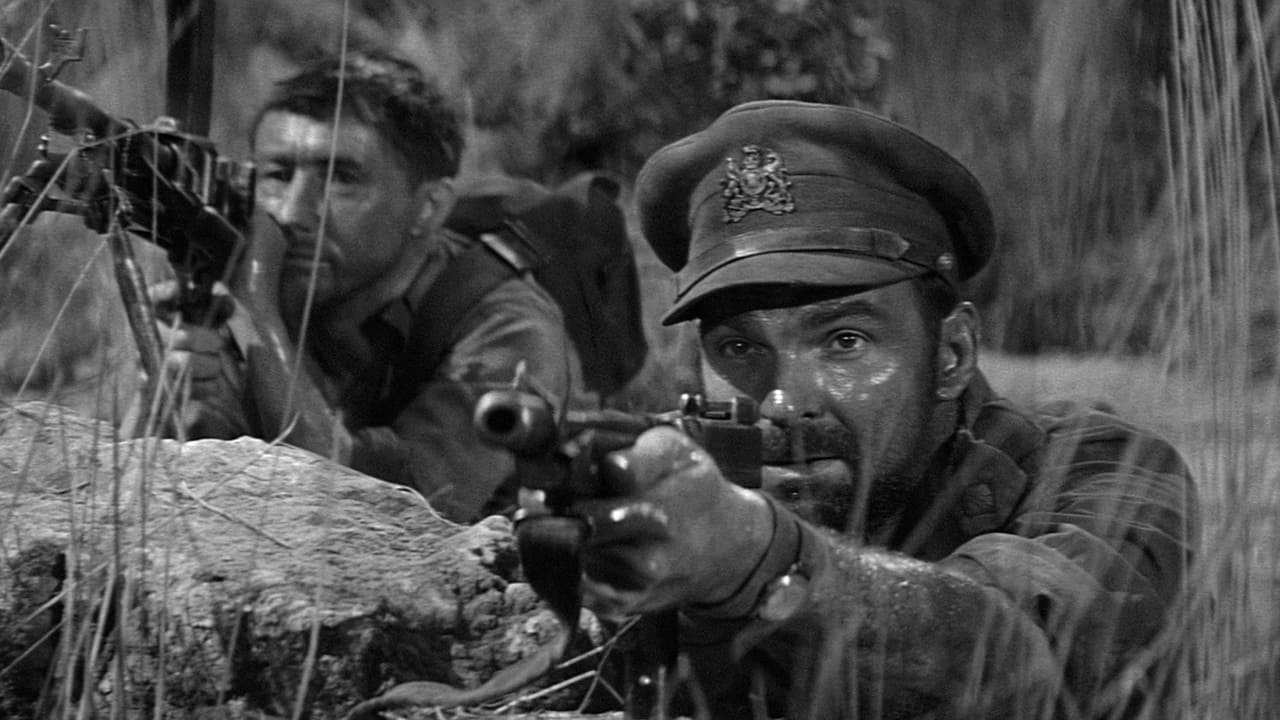arthur_tafero
This is a watchable British war film, where everyone is appropriately sweaty and greasy, but there are several details that make the film highly unrealistic. The Japanese commander is obviously Chinese. I found that annoying. The entire film had the look of being done in all studio shots; no realism at all. Baker is fine; as is the entire supporting cast. The Asian actors give it their best shot, but only the Japanese assistant is believable. I did like the depiction that the British were no more clever, ethical, or braver than the Japanese; the British always did a much better job of that than Americans ever did (with the exception of Letters From Iwo JIma). All in all, the plot was rather mundane; but did the best it could.
SimonJack
"Yesterday's Enemy" is a gritty film about a small British force in World War II Burma. It is also a film about the horrors of war, including unconventional actions. My high rating of this film is for the excellent acting jobs by all the cast. The quality of the film and its "feel" of a studio set in the jungle scenes detracts somewhat. This is a type of story that should be told. The one criticism I have is that the film seems to condone what takes place. It conveys the message that, while war is hell, sometimes things like this may be necessary. The chaplain and the news correspondent rightly protest the captain's plan to kill two innocent natives as a means to get a suspected collaborator to talk. Why did the captain not shoot the suspect in the arm or leg instead? The threat and proof of personal injury are very convincing to people, and wounds can be treated. But the killing of two innocent villagers appears nothing more than mindless barbarism. If anything, it would tell the suspect that he needn't worry. His captors don't want to hurt him. So where is his "incentive" to talk? Only after the British shoot the two natives, and the captain says that he is next, does the suspect agree to talk. But had he been shot in the arm or leg, might he not have gotten the message right away? And thereby, the captain would not have killed two innocent men. No doubt, direct and intentional killing of innocent civilians took place in WWII, and in other wars. But there never can be a justifiable reason for such killing. We know of the atrocities of the Japanese against the Chinese people in December, 1937. Some 300,000 people were murdered and tens of thousands raped and brutalized in the rape of Nanking. We know of the inhumane treatment of military and civilians in many Japanese prison camps of WW II. We know of the Nazi holocaust that killed six million Jews; and of the Nazi brutality and killing of many thousands more. Hitler intended to kill civilians when he bombed London as a way to defeat Britain. We know of the Soviet massacre of 22,000 Polish prisoners – mostly civilians – in the Katyn Forest in April, 1940. In the past century, there were other horrors of war against the unarmed. Most people over 55 will remember the My Lai Massacre of March 16, 1968. U.S. soldiers slaughtered 350 to 500 innocent women, children, babies and elderly in one village in South Vietnam. During World War II, Allied bombers killed many civilians when they hit industrial plants and war supply targets. Navy ship guns surely killed civilians when they pounded islands in the Pacific. While such killing is part of the horrors of war, it often cannot be avoided and is not carried out for the sake of killing the innocent. The U.S. dropped atomic bombs on Hiroshima and Nagasaki to end WW II, but we will never forget the horrors of the hundreds of thousands of innocent people killed or injured for life. Many veterans suffer trauma from their experiences in war, most often from the killing of other people, whether directly or inadvertently (as in bombing or shelling enemy sites). In a cause of justice that is foisted upon men in war, there is a big difference between direct killing of enemy combatants and all other killing and treatment. The mark of civilization is the humane treatment of civilians, prisoners, the wounded and defeated. It is never right directly and intentionally to kill innocent civilians, or to mistreat or kill prisoners of war. That is the difference between civilized and uncivilized people. To the extent that countries and armies have carried out such atrocities as these and others, we show that we are uncivilized. To the extent that we abhor such actions and strive to live with civility toward others, we may yet save our humanity. It is only by civility that mankind is able to survive and coexist in the world.
John von K
Well, I was astonished by how good this film is. Made by Hammer Films in 1959 and despite being shot entirely on set in England it has a deep sense of the grime, heat and fear of the Borneo jungle during WWII.What really holds it together and creates the powerful generator for this film is a gritty, un-theatrical,un-sentimental performance by Sir Stanley Baker. He creates a 3 dimensional character and (Amazingly for a top ranked star) never tries to get the audience to "like him".Other fine performances from Guy Rolfe and Leo McKern make this absorbing film seem way too short. The director Val Guest struggled to have the film released without any soundtrack music and this really helps the atmosphere and leaves it up the the actors to create tension without music bailing them out. There are quite a few unexpected twists and surprises too.The subject matter in 1959 was rather brave and controversial so well done Hammer! It doesn't seem to be available on DVD or Blu-Ray so that goodness for Stagevu otherwise I might never have seen this little gem.
benbrae76
This 1959 black and white WWII movie is one of the most realistic depictions of jungle warfare I have ever seen. Wonderfully acted by all concerned, and the script strikes a clever balance between duty and anti-war opinions. It is about a lost group of soldiers from the "forgotten army" in Burma, trying to reach their own lines, and whilst doing so take over a Japanese held village.The tension is almost unbearable, and the movie never relies on music to enhance that tension, for there is no music in it from start to finish. (And to be truthful in this movie it's not missed.) It's impossible to pick out a star performer. They all are, but I suppose the two that really stand out are Stanley Baker as the commanding officer and Leo McKern as the cynical war-correspondent attached to the group.I have yet to see this movie screened on TV (although someone may set me right if it has), and considering the pap that is aired, I can't think of one reason why it hasn't. It's a terrific film and if you enjoy realistic gritty war movies, then this is the one for you.


 AD
AD



